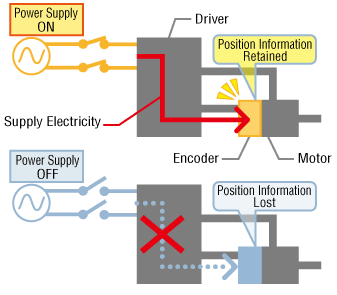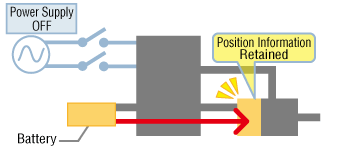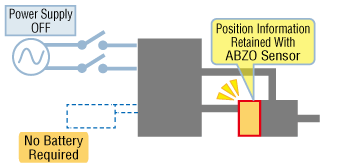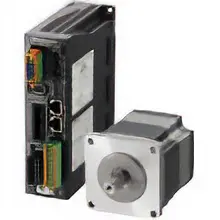What is an Absolute System?


-

What's wrong with that difficult face, Vex?
-

A customer told me that "they wanted to use Abso", so I'm doing some research, but I don't really understand the word Abso...
-

I've heard that a lot lately. "Abso" is an abbreviation for "absolute system." The absolute system and the incremental system are often compared.
-

Absolute system? Incremental system?
-

It can’t be helped. The point of difference between the two is whether they retain position information when the power supply is off or not.
-

When it comes to motor position information... It's the encoder right?
-

Yes, the encoder. First, let's take a look at how the incremental system works. Take a look at the figure below.
Incremental system 
-

This means that when the power supply is ON, the encoder is supplied with electricity, so the position information can be retained, but when the power is OFF... the encoder is no longer supplied with electricity, so the position information is lost.
-

That’s right. Next, let's take a look at the absolute system. See the diagram figure below to see how it works. Even when the driver power supply is turned OFF, the battery still supplies power, so position information can be retained.
Absolute system 
-

I see, but how should the customer use these two systems differently?
-

Even if you know how it works, it's meaningless if you don't know what the benefits are for the customer. There is a table that briefly summarize the two systems, so take a look at the following table.
| Advantages | Disadvantage | |
|---|---|---|
| Incremental System | No battery | To manage position information, return-to-home operation is required when power is turned on. |
| Absolute System | Position information can be managed without a return-to-home operation | Battery required |
-

The Absolute System remembers the position information even when power supply is OFF, so there is no need for return-to-home operation.
That means... You can turn on the equipment and get it running right away. -

Yes, it will reduce takt time. Also, there are cases that the return-to-home operation is no longer needed, eliminating the need of home sensor and limit sensor.
-

No need of sensors means lower costs and less wiring!
-

Just be careful when using batteries. Batteries have a limited lifetime and need a regular maintenance, which adds cost and time for replacement. If you remove the battery, power will no longer be supplied to the encoder and position information will be lost. You may also need to adjust the home again when you disconnect the motor and the driver.
-

I see. Now that I understand how the incremental system and the absolute system work and how they are used.
-

Good to know. So, now that you understand the absolute system, I'll give you some additional information Vex. Do you know the AZ Series stepper motors equipped with battery-free absolute encoders?
-

It’s an absolute system, but no battery required?
-

The AZ Series has a newly developed ABZO Sensor * behind the motor, able to manage position information even without a battery.
- *ABZO sensor: Mechanical multi-rotation absolute encoder
AZ Series 
-

What!! That's amazing. In that case, there would be no need to replace the battery, and there would be no need to adjust the home position even if the control cabinet and mechanism were carried separately. I'll introduce to my customer as soon as possible! The AZ Series is so clever.
-

Vex, even if I'm not around, please keep track of the product information.
-

Yes…! I'll do my best, following the AZ Series’ example!
